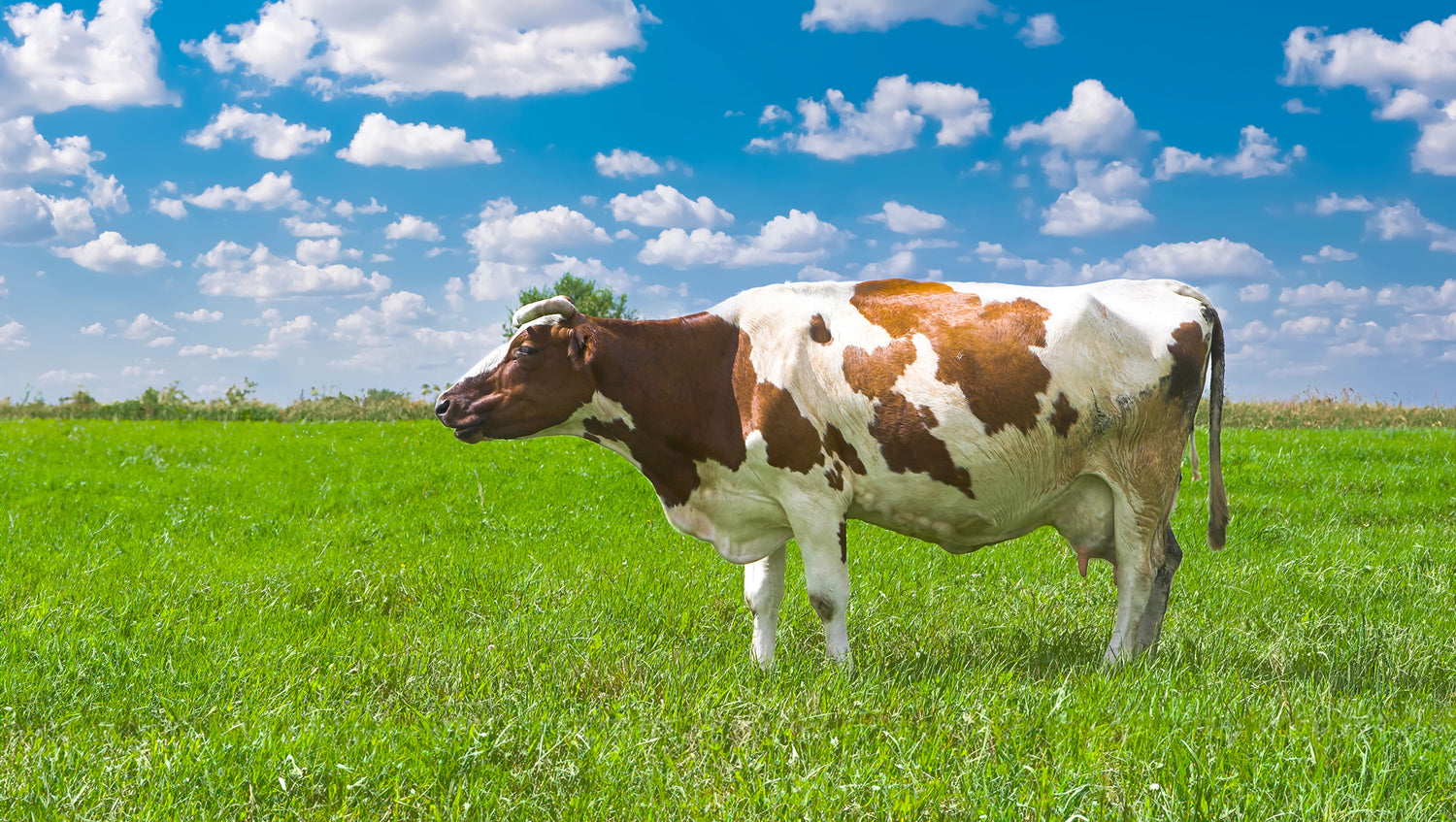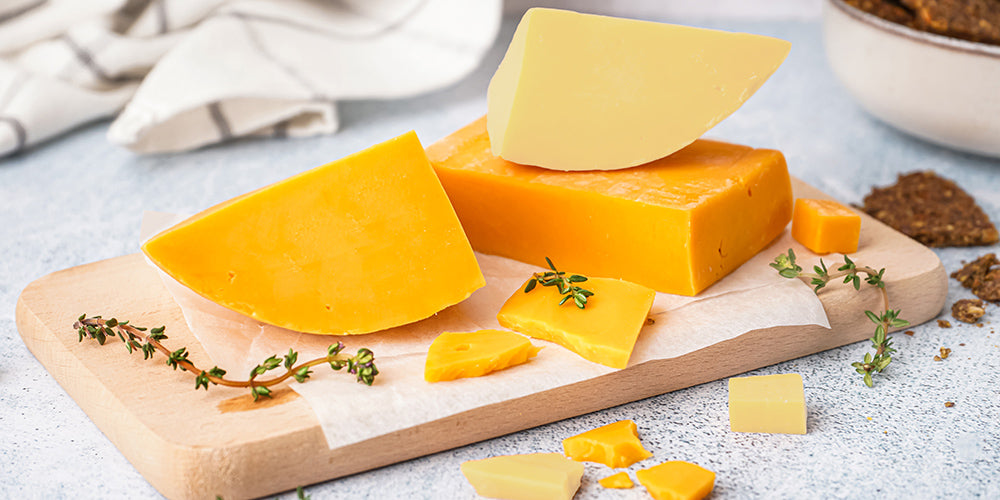"I love cheese from cow's on grass. I generally believe they have more of a broad flavor profile. I also know that cows on grass are more humanely raised, it is better for their health, they live longer. I also know they are happier in pastures over being confined in a barn, happy cows make great cheese."
-Cheesemonger Raymond Hook
Cows are meant to be on lush grass - that's what we all picture when we think about "happy cows" being well-cared for. Grass is the secret ingredient for crafting delicious cheese: the quality and flavor of cheese is very dependent on the milk that is used to make it. And the best milk comes from grass fed, happy cows.
That is why we are such a fan of grass fed cheeses at Capella Cheese. Grass fed cheese is made from milk that comes from cows that primarily have access to pasture, eating grasses and other plants.
Though we carry grass fed cheeses from around the globe, here we have highlighted three of our American cheesemakers that Cheesemonger Raymond Hook has carefully selected to sell in our shop who use grass fed milk as the focus of their cheese production. We are proud to offer their delicious, artisan and award-winning cheeses at our shop.
Sweet Grass Dairy
This dairy’s cows are “barnless” and graze on grass year round. The climate in Georgia allows for this “barnless” approach with consistent access to fresh grass. They practice rotational grazing and embrace the traditional methods that are needed to make cheese of the highest quality. They make the most from their impeccable, grass fed milk to craft beautiful cheese.
Rogue Creamery
Our friends over at Rogue Creamery (which has both a dairy and creamery) in Oregon have taken their commitment to quality, the environment and their animal husbandry, to the next level. They are certified organic and work to build soil health, grow native plants, build biodiversity and aid in carbon sequestration. It is clear that their efforts for sustainability and pursuit of grass fed, quality milk translates to quality and flavor, as they were the first American cheese company to win World Champion at the World Cheese Awards for their Rogue River Blue in 2019.
Uplands Cheese
Uplands Cheese in Wisconsin only produces cheese when the cows are on pasture. Their 500 acre farm consists of a series of small pastures, of which they rotationally graze their cows, giving the cows access to fresh grass about 6 months of the year. During this seasonal window they produce milk for the dairy to craft cheese from. Their commitment to rotational grazing is healthy for both the land and animals, and of course, gives them the most flavorful milk from which to produce their award-winning cheeses.
What is the definition of grass fed milk or cheese?
Certified grass fed milk in the US is defined as a diet exclusively of grass or forage, according to the American Grassfed Association1. This means that the cows have access to pasture year-round, and are only supplemented with hay, silage, or other non-grain feed when necessary. Certified grass fed milk or cheese is also free of hormones, antibiotics, and GMOs. We have producers both in and outside the US who go way beyond this definition of grass fed.
What is different about cheese made from grass fed milk?
Cheese made from grass fed milk is unique in several aspects, such as:
Nutrition: Grass fed cheese is rich in omega-3 fatty acids, conjugated linoleic acid (CLA), vitamin A, vitamin E, and antioxidants. These nutrients can support reduced inflammation and improved immunity. Research from 2013 and 2018 found that grass fed milk is nutritionally distinct from grain-fed milk. Grass fed dairy has significantly higher (nearly double) the levels of omega 3 and CLA fatty acids than grain feed milks.
Flavor: Grass fed cheese has a more complex and diverse flavor profile, as it reflects the seasonal and regional variations of the pasture that the cows graze on. Grass fed cheese can have floral, herbal, nutty, fruity, or earthy notes, depending on the type of cheese and the time of the year.
Color: Grass fed cheese has a more natural and vibrant color as it contains more beta-carotene, a pigment that gives grass its green color and is converted to vitamin A in the body. Grass fed cheese can range from pale yellow to deep orange, depending on the breed of the cow and the season.
Is grass fed cheese good for the environment?
Grass fed cheese is good for the environment, as it supports sustainable and regenerative agriculture practices that benefit the soil, the water, the air, and the biodiversity. Some of the environmental benefits of grass fed cheese are:
Soil health: Grass fed cows help improve the soil health by fertilizing it with their manure, aerating it with their hooves, and stimulating it with their saliva. Healthy soil can store more carbon, retain more water, and support more life than degraded soil.
Water quality: Grass fed cows help protect the water quality by reducing the runoff of nutrients, chemicals, and pathogens from feedlots and croplands into waterways. Clean water is essential for human and animal health, as well as for aquatic ecosystems.
Air quality: Grass fed cows help reduce the greenhouse gas emissions from the dairy sector by emitting less methane, a potent greenhouse gas that is produced by cows when they digest grains. Methane is 28 times more effective than carbon dioxide at trapping heat in the atmosphere.
Biodiversity: Grass fed cows help preserve the biodiversity by maintaining the diversity of plants and animals that coexist on pasturelands. Biodiversity is important for the resilience and productivity of natural systems, as well as for the provision of ecosystem services, such as pollination, pest control, and nutrient cycling.
What are the benefits of eating grass fed cheese?
Eating grass fed cheese can offer many benefits, such as:
Nutritious food: Grass fed cheese has the potential to satisfy both the palate and the body, as it delivers a rich and complex flavor, as well as a high-quality and balanced nutrition.
Supporting small and sustainable producers: Grass fed cheese supports the often small, artisanal and sustainable producers who make it. Grass fed cheese can also help preserve the rural and cultural heritage of the regions where it is made, as it reflects the traditions and values of the people who make it.
Protecting the environment and the animals: Grass fed cheese is a food that can protect the environment and the animals that are involved in its production, as it promotes sustainable and humane practices that respect the natural cycles and rhythms of the land and the cows. Grass fed cheese can also help mitigate the impact of climate change, as it reduces the greenhouse gas emissions and enhances the carbon sequestration of the dairy sector.
Does grass fed cheese taste better?
In a word, simply - yes, the taste says it all! Grass fed cheese is superior in its overall taste profile and complexity that reflects the terroir, seasonal, climate and regional variations of the pasture that the cows graze on. Also the skills of the cheesemaker are another big factor in the quality and final flavor of grass fed cheese.
Grass fed cheese is a superior choice for cheese lovers who care about the quality, the flavor, the health, and the ethics of their food.
Here are a mix of the seasonal grass fed cheeses we offer:
Rogue River Blue
SOURCES
1: https://www.americangrassfed.org/about-us/our-standards/
2: https://journals.plos.org/plosone/article?id=10.1371/journal.pone.0082429
3: https://www.ncbi.nlm.nih.gov/pmc/articles/PMC5980250/




Leave a comment
This site is protected by hCaptcha and the hCaptcha Privacy Policy and Terms of Service apply.